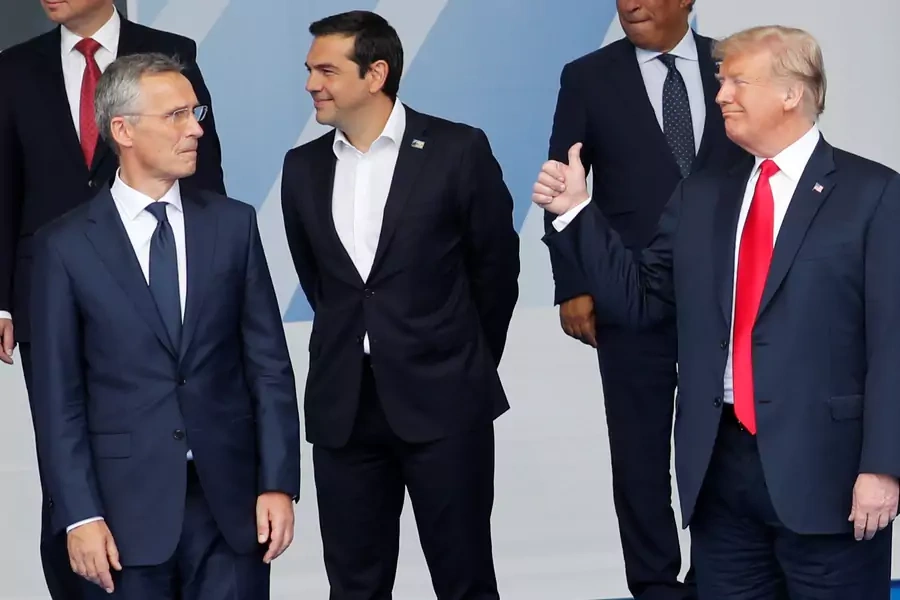A “Value”-less Summit: What to Expect from Trump’s NATO Summit

The following is a guest post from Christopher M. Vassallo, an intern at Foreign Affairs at the Council on Foreign Relations.
If you want to know how this week’s North Atlantic Treaty Organization (NATO) summit will likely play out, look no further than June’s European Union (EU) summit.
More on:
The events of the earlier summit will still be fresh in the minds of European heads of state when President Donald J. Trump arrives in Brussels this week. Trump will likely assume the role of the skeptical populist, intent on dominating the agenda of an alliance he once dismissed as “obsolete.”
To German Chancellor Angela Merkel and French President Emmanuel Macron, the EU’s liberal stalwarts who profess that Europe is stronger together, this spectacle will seem like déjà vu. Two weeks ago, at the EU summit a mere twelve minutes down the road, five Euroskeptic heads of state—the leaders of Austria, the Czech Republic, Hungary, Italy, and Romania—derailed constructive policymaking by haggling over language. Among other tactics, Hungarian Prime Minister Viktor Orban insisted on dubbing migration an “invasion,” and Italian Prime Minister Giuseppe Conte threatened to veto the entire slate of conclusions unless they included concrete plans to reduce refugee numbers.
Trump shares the views of these two hardliners and has been working behind the scenes to support them. In April, he congratulated Orban, a fellow anti-migration crusader with whom presidents George W. Bush and Barack Obama frequently tussled, after his electoral victory. He also promised a White House visit to Conte, who backed Trump’s plan to reinstate Russia to the Group of Eight (G8). Trump might also find common ground with the leaders of Poland, Romania, and the Czech Republic, who comprise the rest of NATO’s anti-migration wing.
For the Euroskeptics, the EU summit provided a welcome showdown between their energized forces—adherents of a populist, nationalist platform, hostile to migration and centralized European authority—and the EU’s traditionally dominant liberal core, led by Western European nations like France, Germany, and Belgium. Trump is familiar with this conflict, which is manifest throughout U.S. politics. His presence along with the Euroskeptic leaders will reveal a similar rift within NATO.
While the EU summit was convened to address a host of issues—including Brexit, American tariffs, and EU expansion in the Balkans—migration monopolized discussions. Even though the flow of migrants into the EU has fallen 95 percent from its 2015 peak, division over the issue in recent weeks nearly toppled Angela Merkel’s chancellorship in Germany and helped forge an unnatural governing alliance between Italy’s radical left and right. During the EU summit, dissension between nationalists and liberals forced an all-night session that produced only a non-binding set of conclusions on migration.
More on:
The EU summit made it clear that the union is a fragile entity, vulnerable to surging populism. The union is premised not on shared nationality, language, or religion, but instead bound together by a more nebulous faith in the common market, open borders, and the supremacy of democratic institutions. By agreeing to restrict open borders within the EU, Merkel and Macron indicated that a premise of the union was subject to negotiation. Like the EU gathering, this week’s NATO summit presents another occasion to discuss shared values—and for populist leaders to force similar compromises on long-established principles.
It is possible, of course, that Trump will reaffirm Article 5 of the North Atlantic Treaty, which he conspicuously omitted from last year’s speech. He could also reassure allies ahead of his one-on-one meeting with Russian President Vladimir Putin, by declaring that neither the U.S. troop presence in Poland nor NATO war games in the east are up for negotiation. But he will almost certainly pass on this opportunity.
Instead, Trump will likely antagonize his already battle-weary audience. He will lecture Europeans on defense spending, repeating his recent letters to each NATO nation not yet spending at least 2 percent of GDP on defense. He will likely touch on tariffs, repeating his particular disgust for German luxury car imports, as he did at last month’s Group of Seven (G7) summit.
What is certain is that Trump, like his Italian and Hungarian counterparts, will sit down with NATO’s weakened liberal core, which has suddenly shown a willingness to compromise on principles that were once off limits. They are increasingly negotiating by his rules, on his terms.
Trump is unlikely to repeat his G7 performance, in which he stormed off, revoked support for the group’s conclusions, and condemned one leader to “a special place in hell.” Why should he, when several NATO allies share his outlook?
What the summit will reveal is the degree to which Trump has transformed the alliance, by simultaneously cultivating illiberal European backers and exploiting the liberal leaders’ willingness to compromise.
What is less clear is whether Trump will offer any positive vision for NATO, one that clarifies the alliance’s enduring purpose in the twenty-first century. To the deal-obsessed U.S. president, it might seem heretical to speak to NATO allies about values, rather than simply make demands. But as the imminent Soviet threat of nuclear annihilation has receded, replaced by a more diffuse threat environment, the foundations of the NATO alliance (like the EU) are fragile, resting on the more vague principle of cooperative self-defense. To survive, NATO requires steady affirmation of why it exists in the first place. If Trump refuses to invoke shared values, only then will NATO truly be obsolete.
 Online Store
Online Store